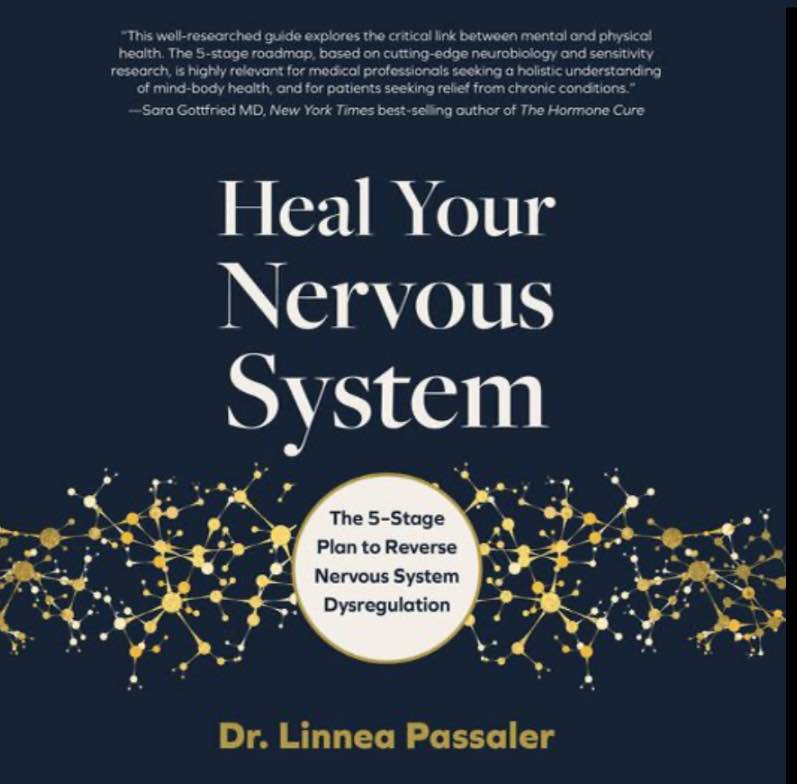Find out your sensitivity profile | Heal Your Nervous System
2024-03-30 summary and takeaways
- dog mind vs lion mind
- Sensitivity is good.
- Nervous system health vs just mindfulness.
- Bodyfulness. Engage the whole body.
- connection to ancestors: we inherit generational issues.
- nervous systems can heal. The whole nervous aystem responds to issues.
- The Worry Cure: anxious mind causes anxious feelings and vice versa. Same with nervous system. Chicken and egg.
- Resiliency of a fern.
- Nature is healing. Connect with it. Connect with self.
- Music and creative expression for 45 min a week. Healing.
- physiologic sigh. Two in, one long out mouth. Practice.
- Healing takes practice. It’s not fast. The quick fix mindset is the problem. Need to approach it as a whole body solution that takes time.
- Rewire the embedded alarms via cognitive processing therapy. One at a time. Practice small. Get into a good state first, then practice. Over time the stimulation will reduce and you’ll have new pathways.
- Imagine the perfect childhood. Perfect boss. Perfect situation. How would someone treat you in that situation? Connect with this. Become it. Self compassion.
2024-03-29
Boundaries - Don’t explain or defend them. Don’t share them. - Set boundaries. If you’re going to talk for 5 min then only talk for 5 min. - Parenting techniques - Placating parent. - Conflict avoiding parent.
Three streps for challenges
- analyze current circumstances. 95% focus on problem. Perceptions vs interpretations of perceptions. Accuracy of interpretation
- expand list of coping strategies. Brainstorm a list of coping strategies.
- Types of coping strategies
- Seeking social support
- Problem solving
- Avoidanve
- positive thinking
- No bad coping strategies. Just less helpful
- Types of coping strategies
Book: attachment disturbances in adults.
Five core needs of attachment(like a house) 1. foundation. Safety and protection. 2. Walls. Attunement. Attune to the feelings. Identify the feelings, provide safety for them. Create a supporting environment, attune to their needs. 3. Roof: sooltjing and comfort. Shelter and security. Reassurance and support. Touch. 4. Windows: expressed delight. Regularly express it. 5. Garden: support self development. Aim for good enough. Support them in new ways.
Secure attachment Dismissive attachment - Solves problems by avoidance or workaholic Preoccupied attachment - abandonemwnt, extra reassurance - Expressed delight was missing - Seek approval or reassurance. - Highly sensitive to rejection - Overshare personal details - Anxiety Disorganized or fearful attachment.
Imagine having your attachment needs met. IPF therapy. IPF protocol. Don’t just think about. Imagine. Feel everything of having met. - Deep breaths - Identify what you need: feeling supported. - Reflect - Imagine ideal parenting. - Create image of what ideal parent figures would look like. - Imagine those ideal parents interacting with your. Imagine them interacting with you in a nice scene. - Visualize and journal about ideal parent figures.
Track or be aware of your heart rate. Interoception: awareness of what things contribute to your stress.
Heartbeat awareness or breathing awareness. - Locate pulse - 30 seconds light. - Locate pulse - 1 minute of mild. - 30 seconds of locate pulse. - 2 minutes of intense
Interoceptive awareness. Body scan. Exteroceptive awareness: your surroundings.
Elevator alertness map: put coping strategies into the map.
Nervous System Regulation: How to Start Regulating Your Nervous System

2024-03-28
- dog mind vs lion mind.
- Create a gap: observe your thoughts
- Eight senses. Proprioceptive awareness.
- Bodyfulness. Bring your whole body.
- Relaxing stretches:
- Eyes to right, Ear to right shoulder, eyes still right
- Salamander: neutral spine on all 4s.
- Diagnosis. How you feel. Disease. Three pillars of wellness.
2024-03-27
- sensitivity: like an orchid or a tulip.
- Belief: those who are more sensitive can rewire faster.
- Neuroplasticity: past patterns can be rewired completely without long term entrenchment
- Four areas
- Embedded alarms: why you don’t make the same mistake twice, or become afraid of dogs.
- Misrepresenting the word “trauma” can cause you to feel higher emotional reactions to more benign experiences. → how you perceive the word and its definition affects you.
Five stages - awareness - Sensory stimulatjon - active proprioception - jump rope - passive Proprioceptive - Massage gun - Deep tissue - Tactile input - Manipulate textured - Olfactory input - Oral (tasting) - Visual - Sleep - Light 10 min after waking. - Light for 10 min in late afternoon. - Dim lights after sunlight, keep low to the ground - Regulation - restoration - Connection - Expansion

_________________________
Bryan lives somewhere at the intersection of faith, fatherhood, and futurism and writes about tech, books, Christianity, gratitude, and whatever’s on his mind. If you liked reading, perhaps you’ll also like subscribing: